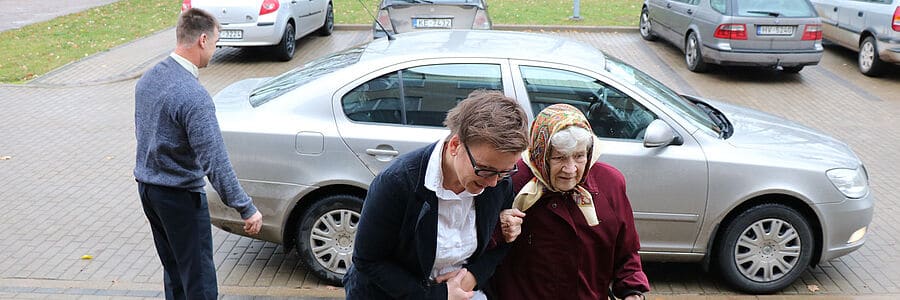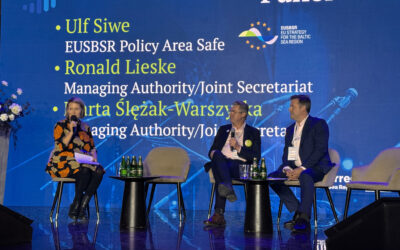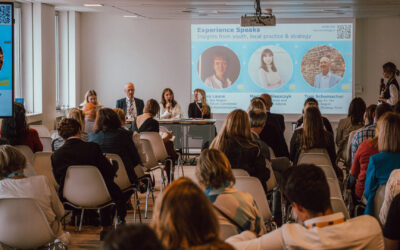Accessibility in remote areas is a topic of growing urgency in the vast territories of the Baltic Sea region: The quality of life of elderly and young people in villages is at stake. Interreg Baltic Sea Region is providing EU funding to three cooperation projects to find solutions. The first one, MAMBA, ended in September 2020 – and delivered some very practical results.

©Vidzeme Planning Region
Rural areas have lost their public transport services
“Almost two years ago the bus stopped driving in our area, and since then I have huge difficulties to get to the county centre,” says a local of Mazsalaca County in Latvia. Mazsalaca, a county of less than 4.000 inhabitants, has a very low population density of less than 10 inhabitants per square kilometre. Mazsalaca is truly rural. Still, the statement above might as well belong to any other resident living in one of Europe’s rural areas, where the decreasing availability of public transport is becoming a problem.
Towards a system to uphold the standard of living in rural areas
In the autumn of 2017, fifteen partners from across the Baltic Sea came together to work on a plan on how to make the region’s rural areas better places to live. Nine local and regional authorities from Denmark, Finland, Germany, Latvia, Poland and Sweden teamed up under the lead of the German charity organisation Diakonia supported by researchers from Latvia, Finland and Germany. Their common goal was to develop a system that would combat the problems caused by the decreasing and ageing population in many rural areas, such as lack of public transport, home care or deliveries and other issues that had a direct impact on the standard of living.
Maximising mobility and making services accessible
Since then, people living in sparsely populated around the Baltic Sea have benefited from ingenious and useful solutions from the MAMBA project: school buses were used in Trelleborg (Sweden) to help elderly people socialize more, taxis replaced buses in the county of Plön (Germany), an app now facilitates mobility in Vejle (Denmark), and a village car is in place in Cuxhaven (Germany).
In addition to these pilots, the project partners collected and analysed more than 100 good practice examples from across Europe: solutions in place for transport on demand, car or ride sharing, mobility as a public service and more. A searchable public database presented also as a clickable map was developed to make these cases easy to find, compare and learn from.
Transport on demand tested in Latvia
One of the solutions is called “transport on demand”. This service was tested in Mazsalaca County and Alūksne County, in the territory of Vidzeme Planning Region (Latvia). In an interview with national television, project manager Līga Puriņa-Purīte of the Vidzeme Planning Region administration said: “With this service, we want to offer our citizens the opportunity to move and travel when they need, not when public transport is running.”
Each of the areas has implemented a different model. In Mazsalaca county, passengers could call in to get a ride throughout the entire territory, while in Alūksne county, five specific locations were designated. The locals have used the service to get to social services, such as the doctor, pharmacy, post office, shops, and also to reach ATMs, bus stations or the central bus stop, to travel to other cities or villages. The transport on-demand completed 75 trips and carried around 200 passengers only in the first six weeks after its launch.
A broader debate has already been launched at the national level, whether transport on demand could be an additional type of service to the typical public transport system. Following the assessment, it is planned to submit proposals to the Ministry of Transport to include the service in the State paid passenger transport system.
Only time will tell
During the three years of the MAMBA project, the partners have developed and birthed several rural mobility solutions that have improved the lives of numerous people in sparsely populated areas in Latvia, Sweden, Finland, Poland, Denmark and Germany. Furthermore, three publications meant to guide, offer advice to policy-makers, and a report detailing the struggles and the victories of each solution, have come out of the project. The last months of the project have found the partners navigating the uncertain times brought by the spread of COVID-19, with some of the solutions developed in rural areas having to be shut down or reorganized, to fit the “new normal”.
Which of these rural mobility solutions will last after the project’s completion is a matter of several factors, such as funding, policy-making, and the interest of end-users. Yet, the fifteen project partners who set out to provide solutions to a wide-spread problem in the vast countries of the Baltic Sea region, have provided and compiled quite some knowledge to further work on a system for rural mobility that works on the ground.






